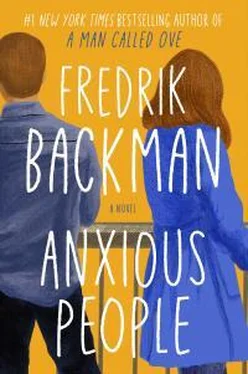The psychologist took a deep breath and said: “I can understand that. So let me just say that my mom and I had a very good relationship. Is that better?”
Zara nodded skeptically and asked: “Have any of your patients ever committed suicide?”
The psychologist’s chest tightened; she replied: “No.”
Zara shrugged her shoulders and added: “As far as you’re aware.”
That was a fairly cruel thing to say to a psychologist. The psychologist, however, recovered quickly enough to say: “I only completed my training relatively recently. I haven’t had that many patients, but I do know they are all still alive. Why are you asking these questions?”
Zara looked at the only picture on the walls of the psychologist’s office, pursed her lips thoughtfully, and said, with surprising honesty: “I want to know if you can help me.”
The psychologist picked up a pen, smiled a practiced smile, and said: “With what?”
Zara replied that she was having “trouble sleeping.” She had been prescribed sleeping pills by her doctor, but now her doctor was refusing to prescribe more unless she spoke to a psychologist first. “So here I am,” Zara declared, and tapped her watch, as if she were the one being paid by the hour rather than the reverse.
The psychologist asked: “Do you think your trouble sleeping is related to your work? You said in your phone call that you run a bank. That sounds like it could be quite a stressful, high-pressure job.”
Zara replied: “Not really.”
The psychologist sighed and asked: “What are you hoping to accomplish during our meetings?”
Zara countered at once with a question of her own: “Will this be psychiatry or psychology?”
The psychologist asked: “What do you think the difference is?”
Zara replied: “You need psychology if you think you’re a dolphin. You need psychiatry if you’ve killed all the dolphins.”
The psychologist looked uncomfortable. The next time they met she wasn’t wearing her dolphin brooch.
During their second session Zara asked, somewhat out of the blue: “How would you explain panic attacks?”
The psychologist lit up the way only psychologists can do at that question: “They’re hard to define. But according to most experts, panic attacks are the experience of—”
Zara interrupted: “No, I want to know how you would explain them!”
The psychologist shuffled uncomfortably on her chair and pondered various different answers. Eventually she said: “I’d say that a panic attack is when psychological pain becomes so strong that it manifests itself physically. The anxiety becomes so acute that the brain can’t… well, in the absence of any better words, I’d say that the brain doesn’t have sufficient bandwidth to process all the information. The firewall collapses, so to speak. And anxiety overwhelms us.”
“You’re not very good at your job,” Zara replied drily.
“In what sense?”
“I already know more about you than you know about me.”
“Really?”
“Your parents worked with computers. Programmers, probably.”
“How… how on earth… how did you know that ?”
“Has it been hard to deal with the shame of that? The fact that they did jobs that had a tangible application in the real world, whereas you work with…”
Zara fell silent abruptly and seemed to be searching for the right words. So the psychologist, somewhat affronted, filled in: “… feelings? I work with feelings.”
“I was going to say ‘fripperies.’ But okay, let’s say ‘feelings,’ if that makes you feel better.”
“My dad’s a programmer. My mom was a systems analyst. How did you know?”
Zara groaned as if she were trying to teach a toaster to read.
“Does it matter?”
“Yes!”
Zara groaned at the toaster again.
“When I asked you to explain panic attacks in your own words, not with the definition you learned during your training, you used the words ‘bandwidth,’ ‘process,’ and ‘firewall.’ Words that don’t fit easily into ordinary vocabulary usually come from their parents. If they had a good relationship with them.”
The psychologist tried to regain the initiative in the conversation by asking: “Is this why you’re good at your job at the bank? Because you can read people?”
Zara stretched her back like a bored cat.
“Sweetie, you aren’t that hard to read. People like you are never as complicated as you’d like to be, especially not if you’ve been to university. Your generation don’t want to study a subject, you just want to study yourselves.”
The psychologist looked ever so slightly offended. Possibly more than ever so slightly.
“We’re here to talk about you , Zara. What are you hoping to get out of this?”
“Sleeping pills, like I said before. Ideally some that will go with red wine.”
“I can’t prescribe sleeping pills. Only your doctor can do that.”
“So what am I doing here, then?” Zara asked.
“You’re the best person to answer that,” the psychologist replied.
That was the level on which their relationship began. Things went downhill from there. But it’s worth saying at once that it wasn’t at all difficult for the psychologist to make a diagnosis of this new patient: Zara was suffering from loneliness. But instead of saying that (the psychologist hadn’t burdened herself with more than half a decade’s worth of student debt just to learn to say what she thought), the psychologist explained that Zara was exhibiting signs that she was suffering from “nervous exhaustion.”
Zara didn’t look up from the newsfeed on her phone when she replied: “Yes, well, I’m exhausted because I can’t sleep, so just get me some pills!”
The psychologist didn’t want to do that. Instead she started to ask questions, with the intention of helping Zara to see her own anxieties in a broader context. One of them was: “Are you worried about the survival of the planet?”
Zara replied: “Not really.”
The psychologist smiled warmly.
“Let me put it like this: What do you think the biggest problem with the world is?”
Zara nodded quickly, and replied as if the answer were obvious: “Poor people.”
The psychologist corrected her in a friendly way: “You mean… poverty .”
Zara shrugged. “Sure. If that feels better for you.”
When they parted, Zara didn’t shake hands. On her way out she moved a photograph on the psychologist’s bookcase and rearranged three books. Psychologists aren’t supposed to have favorite patients, but if this psychologist had one, it definitely would not have been Zara.
It wasn’t until their third session that the psychologist realized how unwell Zara was. It was just after Zara had explained that “democracy as a system is doomed, because idiots will believe anything as long as the story’s good enough.” The psychologist did her best to ignore that, and asked Zara instead about her childhood and work, wondering repeatedly how Zara “feels.” How do you feel when that happens? How does talking about this make you feel? How do you feel when you think about how you feel, does that feel difficult? So in the end Zara did feel something.
They had been talking about something else for a long while, and suddenly Zara seemed to be looking deep inside her, and when she spoke she whispered the words, as if her voice were no longer her own.
“I’ve got cancer.”
The silence in the room was so extreme that you could hear both women’s heartbeats. The fingers falling flat on the notepad, the breathing that grew shallower, lungs filled no more than a third with each breath, terrified of making a noise.
Читать дальше












